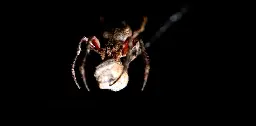City light pollution is shrinking spiders’ brains
City light pollution is shrinking spiders’ brains
Bright lights at night may alter the brains of nocturnal arachnids, our new study shows. And we’re only just learning what this means for our ecosystems.

In new research published in Biology Letters, we studied how light pollution affects the development of Australian garden orb weaving spiders. We discovered it makes their brains smaller, particularly in the regions devoted to vision – with unknown effects on their behaviour.
What light pollution means for animals
Artificial light is one of the fastest-growing ways humans are polluting the world, and it has a huge range of effects on animals, plants and ecosystems. Recent evidence suggests the stress of living with light pollution may impair the growth and development of the brain in some birds and mammals.
This may be catastrophic. To survive in novel environments where light pollution is most common, such as cities, animals may actually need larger and more complex brains.
But what about insects and spiders and other, smaller creatures that inhabit the night? Could light pollution similarly affect the growth and development of their brains?
Our study on the nocturnal Australian garden orb weaving spider suggests it does.